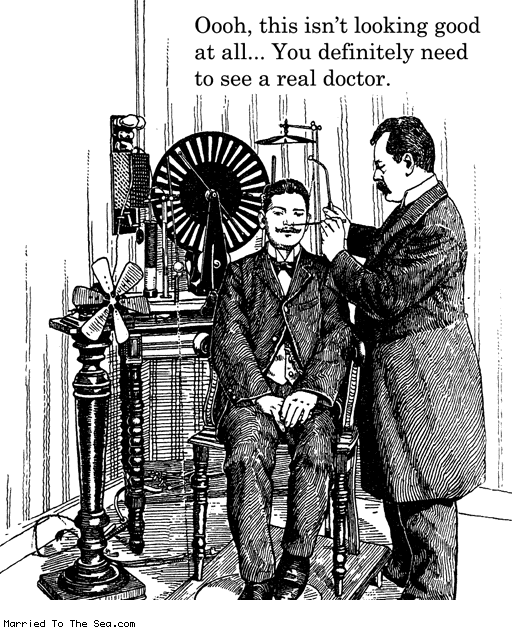The egypt/jordan vacation is over now, and it is time to return this blog to its regularly scheduled programming, at least for a little while. To ease you back into the transition, I have interspersed my thoughts with another newly interning medical blogger, anondoc. He tends to be a bit more cynical than I, but like all interns right now, we are all going through the same worries and thought processes
 marriedtothesea.com
marriedtothesea.comI have been an acutal honest to goodness doctor for just about a month now. I havent had much to post about it because the way my schedule works out, I am on a research elective for my first block, which means I only see patients once a week during my continuity clinic, or when I am pulled for backup call. Even so, it is a strange feeling to realize that I actually AM the doctor now.
You would think it wouldn’t be much of a transition from medical student to intern, but I have to admit it’s a lot more different than I realized. For the first time, you’re actually on the hook for knowing things. You’re the one who has to be the expert on the patient– you’re not just the observer. And when the attending says the patient needs this test or that test, this medication, that dosage– you’re the one who’s going to have to implement it.
It used to be so easy– you just listen and nod, and if you tuned out for a second, it didn’t matter. Now I’m actually the one who has to do this stuff. It’s stressful. More than I thought it would be. At the same time, it’s so weird that now when I’m introducing myself as a doctor, the patients really do sit up and listen. Twice they asked how to spell my name, so they could write it down– so they could refer to me later. As in, “Doctor so-and-so said I should take that pill.” As if I know anything!
My first patient ever came into clinic with what is probably allergic rhinits, or maybe new onset asthma. And she told me what she had tried and what hadnt worked and asked me what she should do next.
And it’s not like I can say, “oh, wow, it’s my first day as a doctor– ever! In fact, right after this, I’m going to go on the Internet and google your symptoms, just so I make sure I am thinking the right things– and then I’m going to look back at my textbooks from medical school so I have some clue about it and don’t sound like an idiot!
On a extra night shift I did, I was paged for a patient who had an arrythmia on her telemetry monitor. The nurse is asking me what I want done, and I want to tell her, I have no clue…I dont know this patient, I am just covering the night shift, I barely even know how to read an EKG correctly. But I put on my best “doctor voice” and tell her I will go up to the floor and asses the patient myself.
And I check the patients chart so I dont go in totally uninformed…and the patient has had irregular heartbeats for a long time, and is DNR, and old, and really the only way to fix the problem is with a pacemaker which will never be given due to being old and DNR, so basically I have to go in and listen to the patients heart and tell her the plan is to do absolutely nothing…
If patients knew how little I know as an intern… if they knew how little most of us know…. It’s really scary how much faith people put in doctors. It’s scary how much they assume we know everything and we’re going to fix them. Truth is, most of the time, even the best doctor is faking it to some extent, and doesn’t know a whole lot. We can look things up, and see what the accepted course of treatment is… but if you have something complicated, we have no idea how your body is really going to respond, and why one person heals and one person doesn’t, why one person lives and one person dies. We’re trying our best (most of us), but we just don’t know a lot.
I walk in and the entire family of the patient is there, all looking to me (ME??!!) for answers I dont have, and couldnt possibly give. So I basically just explain to them what her heartbeat is, and that because of that heartbeat we cant give any drugs or surgeries, so right now we just wait.
…
…
…
And they actually accept that. I am stupefied. I spent 5 minutes telling them we will do nothing, and they thanked me for it. I walked back to my workstation, expecting to be repaged by the nurse any minute to go back to the room and actually DO something, like I just used my white coat as a shield to fake my way out of anything. But it never happened.
I wonder how long it will be before I can stop walking into patients rooms and thinking to myself “DONT CODE DONT DONT CODE DONT CODE DONT CODE”
But at the same time, despite all my ignorance, my doubts, my insecurities, my abject mind numbing terror, there is no place I would rather be.


Recent Comments